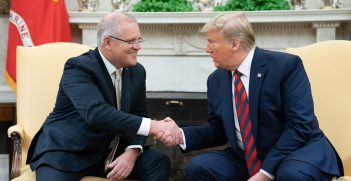Australia’s Growing Asian Minority: The Impact on Foreign Policy

Certain commentators have argued that immigration intakes will eventually start to shape the foreign policy of a recipient country. But in the case of Australia and its growing Asian minority, adaptation has been slow to occur, with some decisions actually being contrary to what one would expect from more Asia-sensitive governments.
George Megalogenis has contributed two important articles to recent issues of Australian Foreign Affairs (issues 1 and 5), highlighting Australia’s changing demography and the implications for Australian foreign policy. The key point is how immigrants from Asian countries and their descendants make up an increasing proportion of the Australian population; Asian-born people are now about 12 percent of the population (issue 5, p 73), although there is considerable variation across the country. Queensland and Tasmania are the states with the highest proportions of Australian-born; Sydney and Melbourne are the most cosmopolitan parts of Australia.
According to Megalogenis, Australian foreign policy needs to adapt to Australia becoming a Eurasian nation. This essentially means having more sensitivity to the concerns of our Asian neighbours, focusing less on the United States and Western countries, but not necessarily subordinating Australia’s concerns to major Asian countries (particularly China) either. While former Prime Minister John Howard is credited with making a good transition to adapting to the new environment over the course of his leadership, recent prime ministers do less well.
There are at least two general issues posed by Megalogenis’s argument. One concerns the way in which a state’s foreign policy changes in response to a changing ethnic composition (in this case, Australia’s significant Asian minority). The other is how Australian foreign policy should adapt to this changing situation.
How does a state’s changing ethnic composition affect its foreign policy?
The issues posed by Megalogenis do not affect Australia alone. While the proportion of Australia’s population that is of immigrant background is one of the highest in the world, there are other countries that are similar in this respect. According to the United Nations Department of Social and Economic Affairs, Australia is exceeded by Singapore and matched by Lebanon. In ascending order Canada, New Zealand, Israel and Switzerland are in the 20 to 29 percent band. Among major Western countries, France, the United Kingdom, the United States and Germany are in the 10 to 15 percent band (ascending order again). Clearly, circumstances can vary among these different countries, with Singapore having large numbers of guest workers, Lebanon hosting many Syrian refugees, Israel taking Jewish immigrants and New Zealand hosting Pacific Islanders (but also growing numbers of Asians). Germany is noted for having large numbers of Turks, the United States for its Hispanic minority, the United Kingdom for its post-imperial immigration from South Asia and the Caribbean (not to mention groups from European Union countries such as Poland), while France has the largest Muslim minority in Western Europe (mainly from North Africa).
It is not only current immigration figures that are relevant. Cultural diversity can be long-standing and have affected foreign policy over an extended period. In the Empire/Commonwealth context we can think of the French-Canadian influence on Canadian policy in the two world wars, and (even more pronounced) Afrikaner influence on the policy of the then Union of South Africa in the same conflicts. The United Kingdom can be characterised as a multi-national state, in fact leading to a breakup of that state with the separation of the Irish Free State in 1922 (the Republic of Ireland from 1948). According to Megalogenis’s argument, the South Asian and Caribbean minorities in the United Kingdom should make British foreign policy more sensitive to the concerns of those regions. France should also be more sensitive to the concerns of the Muslim world.
This points to an argument made by Megalogenis in relation to Australia: the relevant political institutions have not changed much in relation to the ethnic changes that have occurred. The institutions that shape foreign policy have been slow to adapt to the demographic changes that have occurred. Therefore, more traditional ways of thinking about foreign policy have taken precedence. This has occurred in many polities, not just Australia.
The Australian case
Thinking more specifically about the Australian case, has Australia’s foreign policy adapted to the emergence of a significant Asian minority? As indicated, Megalogenis argues that there should have been adaptation but this has been slow to occur, with some decisions actually being contrary to what one would expect from more Asia-sensitive governments. Contrary to the argument that Australian foreign policy has remained that of a “white outpost” I would argue that Australia has been increasingly sensitive to its Asian environment since at least the 1970s, developing a foreign policy that is far more sensitive to Asian developments than was the case in the 1950s and 1960s. The latter two decades were the era of “forward defence,” fighting alongside Australia’s “great and powerful friends” (the United States and the United Kingdom) in Korea, Malaya/Malaysia and Vietnam. While security concerns have continued to play an important role in subsequent decades, Australia has avoided involvement in actual wars, contributing instead to peace operations in Cambodia and East Timor (and Solomon Islands in the Pacific islands region). Most importantly, these decades have witnessed the “rise” of China, and an increasingly complex political environment with Japan and India also present as major powers, together with a range of middle powers such as South Korea and the Association of Southeast Asian Nations’ countries (Indonesia being particularly significant). Apart from the security dimension, these decades have also witnessed the emergence of the Asian region as Australia’s major trading partner, with some one-third of Australian exports currently going to China and over half of all exports going to Northeast Asia and Southeast Asia combined.
It is clear that these changes in Australian foreign policy have been in response to the evolution of security and economic circumstances in the Asian region. It is less clear that the growing Asian minority has been a significant factor. While one might hope that people from the Asian minority would be helpful in assisting Australian governments to better understand the changes occurring in their home countries, it is difficult to point to relevant examples. Perhaps the most obvious impact of the Asian minority is in relation to political issues affecting the home countries. The Vietnamese community in Australia (or elements thereof) has been active in support of human rights in Vietnam, sometimes complicating Australia’s government-to-government relations. Some Chinese Australians have also been active in support of human rights in their homeland; other people strongly support the policies of the People’s Republic, sometimes leading to accusations that they are a “Trojan horse.” The East Timor (Timor Leste) issue has at times complicated Australian relations with Indonesia. While these three countries are the most obvious examples of Australia’s increasing Asian population (through the relevant ethnic communities, particularly in the first two instances) affecting Australian foreign policy, there is scope for Australian relations with other Asian countries to be similarly affected should divisive domestic or foreign issues in those countries cause concern to the relevant communities in Australia.
How should Australian foreign policy adapt in response to Australia’s growing Asian minority?
Whatever the facts of the situation, Megalogenis’s argument is that the increasing Asian minority should result in an Australian foreign policy that is more sensitive to Asian concerns. Adaptation of Australian institutions to accommodate the growing Asian minority would assist in meeting this goal but this has been slow to occur. This last point is incontrovertible if one believes that Australia’s parliamentary institutions should broadly reflect the makeup of the Australian population. One would hope too that there would be a better understanding of relevant circumstances in the range of Asian countries. Precisely how culture should affect foreign policy is more debatable.
On the one hand, Australia’s changing demography means the cultural connections with the United Kingdom become diluted but without disappearing. On the other hand, Australia’s interests (or, more accurately, perceptions of those interests) concerning security and economics as they relate to the Asian region derive from Australia’s geopolitical and economic circumstances. These interests will be broadly the same irrespective of Australia having a growing Asian minority. The pursuit of those interests should be facilitated by a better understanding of the various Asian countries, and ideally, Australia’s Asian minority should be helpful in that respect. However, there is also an argument that the Asian minorities over time adapt to the dominant Anglo culture, absorbing the outlook of that culture (the dominant culture will also evolve, perhaps becoming more “Eurasian,” but this term requires definition).
In the 1990s Samuel Huntington in his “clash of civilizations” thesis argued that Australia was a “torn country,” divided between its Western roots and its adaptation (excessive in his view) to the Asian context. In my view, there is no reason why Australia cannot “have its cake and eat it too.” In other words, Australia can respect its Western roots and the connections they provide, while also welcoming Asian-Australians and the links they bring. In any event, Australian governments in engaging with the Asian region will focus primarily on Australian security and economic interests as they see them. If they are wise, they will be more aware of Asian sensitivities, and Australia’s Asian minority should contribute to this goal.
Derek McDougall is a professorial fellow in the School of Social and Political Sciences at the University of Melbourne.
This article is published under a Creative Commons License and may be republished with attribution.





